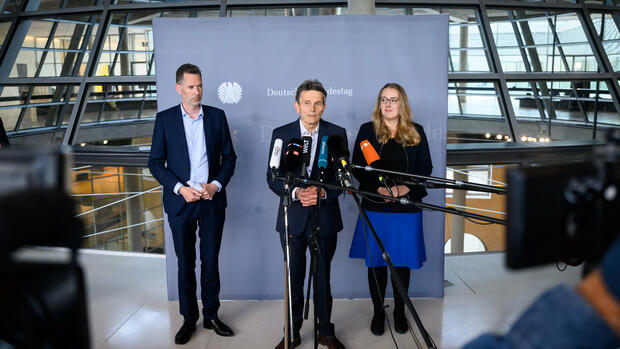Berlin The controversial law on replacing old oil and gas heating systems is to be introduced in the Bundestag on Thursday. The heads of the coalition factions reached a compromise on Tuesday afternoon together with Chancellor Olaf Scholz (SPD), Economics Minister Robert Habeck (Greens) and Finance Minister Christian Lindner (FDP).
The GEG is closely linked to heat planning in the municipalities: The rules of the GEG, which is due to come into force on January 1, 2024, only apply once there is municipal heat planning. A law on heat planning is – independent of the GEG amendment – in progress. The law would oblige the municipalities to determine the potential for connecting buildings to heating networks.
House owners who have the prospect of being connected to a heating network can save themselves the costly installation of an electric heat pump. In a paper that summarizes the most important results of the compromise under the title “Guard rails of the traffic light groups for further consultation of the GEG”, it says that Germany-wide municipal heat planning “we are aiming for by 2028 at the latest”.
As long as there is no municipal heating plan, gas heaters may also be installed from January 1, 2024 if they can be converted to hydrogen. This also applies to new buildings outside of purely new development areas.
Openness to technology is becoming more important: In the past few weeks, the Liberals have complained that the GEG draft focuses too much on electric heat pumps. The coalition partners have now agreed that different options will be treated equally when switching to climate-neutral heating systems. Heating systems that are operated with wood and wood pellets therefore meet the 65 percent requirement of the GEG without exception. The 65 percent requirement states that at least 65 percent of new heating systems must be operated with energy from renewable sources.
Tenants should not be burdened too heavily: Landlords should be given incentives to invest in modern heating systems – for the benefit of the tenants and without overburdening them. “Therefore, we will further develop the existing funding framework, taking into account the modernization levy,” says a paper from coalition circles, which summarizes the main contents of the compromise.
The funding offers are being revised: The paper goes on to say that households should not be overwhelmed as part of the necessary new investments. That is why there will be federal funding “which will be financed from the climate and transformation fund and will take into account the individual needs and social hardships right down to the middle of society as precisely as possible”. No one should be obliged to do something that they cannot afford in their current situation.
SPD faction leader Rolf Mützenich described the agreement as a “paradigm shift”. The four changes will create more reliability, said Mützenich on Tuesday evening after the traffic light tips had been agreed. Now the way is clear for the submission to the Bundestag this week.
Week-long argument ends
The compromise ends a week-long dispute that had developed into a severe test for the traffic light coalition. With the agreement that has now been reached, it seems very likely that the amendment to the Building Energy Act (GEG) can be passed by the Bundestag as planned before the summer break.
With the heating law, the federal government wants to ensure more climate protection when heating. The traffic light coalition had been arguing about the energy turnaround in the boiler room for weeks. In April, the federal cabinet approved the draft law by Economics Minister Robert Habeck (Greens) and Federal Building Minister Klara Geywitz (SPD). The heads of the SPD, Greens and FDP had previously agreed that the amendment to the GEG should be passed in the Bundestag by the parliamentary summer break.
Nevertheless, the FDP called for a complete revision of the plans for the gradual replacement of the heating system and thwarted the date for the first reading in parliament in May. This would have been the start for the work of the parliamentarians in the Bundestag committees, who could adjust the plans in several points. Economics Minister Habeck then accused the Liberals of “breach of word”.
The Chancellor negotiated with the traffic light groups on the draft law on the GEG.
(Photo: dpa)
On Tuesday morning, Habeck appealed to his coalition partners to pass the heating law before the parliamentary summer recess. The GEG has occupied Germany long enough, said the Greens politician. “A lot of debates have been held. It doesn’t get better if you leave it.” It’s now about more than the heating law. “The government should already be demonstrating its ability to govern.”
The liberals are convinced that the original version of the draft law was too rigid. The FDP wanted openness to technology, longer transition periods and less coercion. FDP General Secretary Bijan Djir-Sarai said Tuesday morning that the previous changes to the draft did not go far enough. The law still has enormous deficits, it is inefficient for the climate and unsettles people.
A greener heat supply is necessary because the building sector has so far caused high climate-damaging CO2 emissions. According to the Ministry of Economic Affairs, almost half of the approximately 41 million households in Germany heat with natural gas, followed by heating oil with almost 25 percent and district heating with a good 14 percent.
Direct electricity heating and heat pumps therefore each account for less than three percent. This means that more than 80 percent of the heat requirement is currently covered by burning fossil fuels.
More: GEG – What costs the CO2 price would mean for private households
